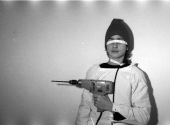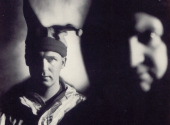
Milestones in Music History #50: Flying Lotus, Beyond Any Definition
One might think that experimentation reached its peak with The Dillinger Escape Plan, the protagonists of our last episode, that nothing could surpass their summit. Yet in music, something cannot be established forever and what came in the world of electronic music in the 2000s confirmed this. To prove this point entered Flying Lotus and changed our understanding of the music genre once and for all.
Everyone expected that the 2000s would bring great technological changes and upheavals in our daily lives and social relationships. Certainly, what many science-fiction films of the 1970s predicted came true – albeit in different forms from those that had been staged by cinema. The musical world, however, showed such evolution that no one would have really imagined thirty or forty years ago.
On the west coast of California – a place where numerous artists and music producers have sprouted up over the decades, a magical and inspirational place – hip-hop and rap have always dominated, as an expression of underground culture and an outlet for the poorer classes. This was the musical substratum in which black culture expressed its ideas and frustrations. Hip-hop and rap; but also jazz, which had always developed in the same social circles.
It can be said without a doubt that Steven Ellison had jazz music in his blood. Literally. His grandmother was the famous jazz pianist Alice Coltrane, wife of the even more famous jazz saxophonist John Coltrane. Furthermore, Alice's sister Marilyn McLeod was famous for composing lyrics for Freda Payne and Diana Ross (for the latter she wrote the famous "Love Hangover").
But it was Alice above all who had a great influence on Steven, who wanted to pursue artistic studies and attended the Los Angeles Film School and the Academy of Art University. But intending to be able to get closer to the music world, Steven started an internship for the hip-hop record label Stones Throw Records.
It was founded by DJ and producer Peanut Butter Wolf, which was hip-hop-oriented but also covered experimental psychedelic rock. One of the most avant-garde labels of the time, it allowed Steven to delve deeper into musical discourse. The opportunity came when he answered an ad on Adult Swim, where they were looking for songs to be submitted. So, he submitted some, using the name Flying Lotus – a name that had come to him after an experience of lucid dreaming.
Meanwhile, Flying Lotus – also known as FlyLo – was working on his first album. Thus, 1983 was released on October 3rd, 2006, the title of the album coming from Steven's year of birth. It received favourable but not brilliant reviews from critics, probably because it's a very difficult album, which ranges from hip-hop to experimental jazz.
It's a complex album that marks a turning point, a work that cannot be classified into any genre, yet it somehow represents the evolution of modern music, including experiments with Japanese synth-pop, African rhythmic and tribal music (he has always been interested in his origins, subjecting himself to a DNA test that linked him to the Tikar tribe of Cameroon).
But the real turning point for Steven came the following year, with the signing of a record deal with the independent British label Warp Records, known for giving space in the early '90s to the UK bleep techno scene, promoting artists such as LFO, Nightmares on Wax and Forgemasters, and the label's 1992 compilation Artificial Intelligence founded the so-called intelligent dance music or IDM.
With the Flying Lotus label, he first released a six-track EP, Reset, which was released at the end of 2007. In the meantime, his popularity soared, to the point of becoming the label's spearhead. Thus, the following year, his second album was released, a 17-track record dedicated to his city, and named, precisely, Los Angeles.
Acclaimed and well-received by critics, it consolidated the experimental approach already present in 1983, deepening the discourse on rhythm and African tribal culture. While it can be considered one of the seminal electronic/dance/IDM albums, the influences of black music, jazz and the underground hip-hop scene, in particular from Detroit. Additionally, the influence of James Dewitt Yancey, also known as J Dilla, who Flying Lotus cites as an important source of inspiration, is evident.
With Los Angeles his success was firmly established, and Flying Lotus came to collaborate more and more with artists such as Gonjasufi and Samiyam (who had collaborated on the album), and with Radiohead, for whom he remixed 'Reckoner' from their album In Rainbows. But in 2011 Flying Lotus took off, with the release of his third studio album, Cosmogramma.
An experimental, afro-futuristic dance journey, with tribal beats alternating with jazz phrasing and hip-hop beats. It's an extraordinary work of pure originality and beauty. Thom Yorke and Laura Darlington, among others, participated in the album, and it was recorded with live instrumentation and vocals. Indeed, it possesses a kind of mysticism, given by this kind of recording experience.
Cosmogramma represented the entry into the musical world of the future, where genres, definitions and differences in culture and gender do not exist. With this album Flying Lotus managed to pierce the veil of Maya, taking us by the hand into the new dimension of electronic and experimental music. His following works, Until the Quiet Comes (2012), You're Dead! (2014) and Flamagra (2019), are jewels that confirm Steven's brilliant musical path.
A complete artistic journey, which also saw him create the score for the 2021 anime feature film Yasuke for Netflix. Last year Flying Lotus released two singles in collaboration with Devin Tracy, "You Don't Know" and "The Room". Furthermore, a sci-fi horror film, Ash, will be released this year, of which he will be the director.
lying Lotus has been able to convey its musical DNA, the result of ancient interpolations, with the rapid evolution of the phenomena of the future. Almost like a prophet, a visionary, he managed to pick up signals from the future of what music has become, is today, and will be in a long time.
The versatility of his artistic work has inspired and will inspire entire generations of musicians and musical genres. But this desire to dare, to go further, has very distant roots. A long time ago, someone decided it was time to cut back on acoustic sounds, and welcome distortion: Link Wray, star of our next episode of Milestones.
What is the evolution of "genre" today? Are there musical categories in the era we live in? How is it possible to combine one's DNA and substratum with contemporary progress, while remaining true to oneself? And is it even necessary to remain true to oneself?
Leave your opinion in the comments below!
If you have found an error or typo in the article, please let us know by e-mail info@insounder.org.





